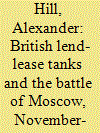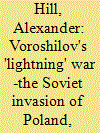| Srl | Item |
| 1 |
ID:
076044


|
|
|
|
|
| Publication |
2006.
|
| Summary/Abstract |
State Defence Committee Decree Number 1497 of 26 March 1942, around extracts from which this short article is based, gives details of Soviet distribution of 'Lend-lease' equipment and supplies delivered by the Arctic convoy PQ-12 in March 1942. The extracts, with supporting notes, provide a rare glimpse of the use to which the Soviet Union put such aid during the spring and summer of 1942.
|
|
|
|
|
|
|
|
|
|
|
|
|
|
|
|
| 2 |
ID:
121005


|
|
|
|
|
| Publication |
2012.
|
| Summary/Abstract |
Using a range of Soviet archival sources and memoirs this article examines the contribution made by US-supplied tanks and other armored and unarmored vehicles to the Soviet war effort, focusing on examples in Soviet archival photographs reproduced alongside the text.
|
|
|
|
|
|
|
|
|
|
|
|
|
|
|
|
| 3 |
ID:
092912


|
|
|
|
|
| Publication |
2009.
|
| Summary/Abstract |
This short article returns to the issue of the value of British Lend-Lease tanks for the Soviet war effort during late 1941 from a research note in Volume 19, Number 2 of this journal.
|
|
|
|
|
|
|
|
|
|
|
|
|
|
|
|
| 4 |
ID:
079142


|
|
|
|
|
| Publication |
2007.
|
| Summary/Abstract |
After having been Russia's sole outlet for maritime trade with Western Europe in the 17th century, the founding of St Petersburg on the Baltic in 1703 led to a rapid decline in the importance of northern waters and the port and shipbuilding center of Arkhangel'sk in particular. Only after the outbreak of the First World War did the north once more see significant investment in maritime infrastructure and the presence of substantial naval forces associated with the delivery of supplies for Russia's war effort from her allies. After the Civil War the fledgling Soviet regime all but removed Soviet naval power from the region on economic grounds, returning to the issue following the construction of the Baltic-White Sea Canal in 1933, after which the exploitation of Northern Sea Route to the Far East also received increased attention. Soviet naval power in the north saw significant investment as the Great Patriotic War loomed on the horizon, even if by June 1941 ambitious plans had been far from fulfilled.
|
|
|
|
|
|
|
|
|
|
|
|
|
|
|
|
| 5 |
ID:
133759


|
|
|
|
|
| Publication |
2014.
|
| Summary/Abstract |
The Soviet invasion of Poland of 17 September 1939 may not have met widespread Polish resistance, but a number of significant engagements saw the Red Army take far from insignificant losses in a rushed operation characterized by overconfidence, poor planning, and cooperation between arms and inadequate logistical support. Materials published in Russian and English since the collapse of the Soviet Union and Soviet academic hegemony over Eastern Europe now allow us to examine the Soviet conduct of the invasion in much more detail than had previously been the case. Much of the material presented here on the topic is to be included in a chapter of a monograph concerned with Soviet military effectiveness during the period of the Second World War, and comments are welcome.
|
|
|
|
|
|
|
|
|
|
|
|
|
|
|
|